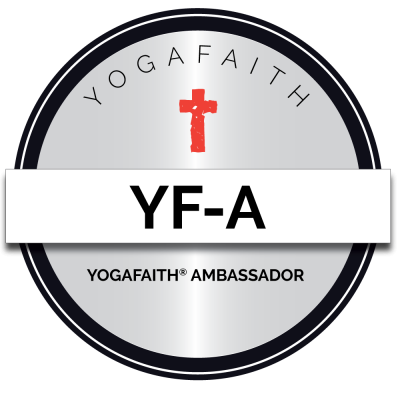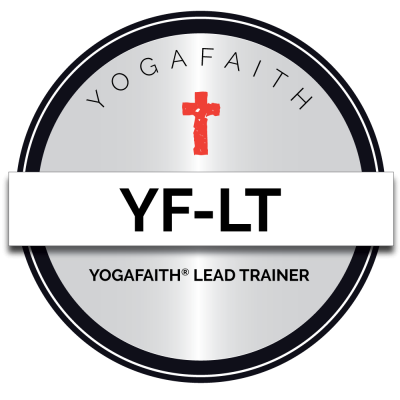Registered, Certified, Licensed and Credentials Defined
by Michelle Thielen, Founder of YogaFaith
The difference between accreditation, licensing, certification, and registration can be confusing. We will define each one in an effort to clarify the terms and usage of each in the yoga world.

Certification
Most certifying organizations have self-governing or external third-party standards to which their program adheres. Once a person completes a specific program and has met those standards, they receive a certification or ‘Certificate of Completion.’ This certification refers to the completion of the program and evidence they met the standards of the issuing organization or accreditor.
A certificate from an educational institution provides your credentials and often includes information on how to maintain that certification. A credential is proof (certification, document, etc) of qualification, competency, or an area of expertise. On the other hand, a certificate from a registry or directory is not a certification to teach yoga from a governing body or educator. It is simply a document that indicates proof of registry with that organization.
A Yoga School is the entity that sets the standards for what is included in their educational process and certification program. Most employers require that you hold a yoga certification, or the skill set that is comparable to a certification of completion. Though a “200 hour” has become standard within yoga schools, there is no universal standard for certification. Most employers require and prefer an audition or demonstration class over credentials to employ a yoga instructor. Keep in mind that there is an entire generation of yoga teachers who have been teaching many, many years before yoga schools and directories existed.
When choosing a certification program, it is important to ensure that the program is in alignment with your values and belief system. Be sure to see the program’s outline, call and ask questions and view a list of the required textbooks.
Receiving a certification from YogaFaith is evidence that one has completed comprehensive training in various styles of yoga, anatomy, and philosophies from a Christian perspective. As a ministry we have aligned ourselves with organizations and directories that complement our core values, philosophies, and beliefs.

Registration as Accreditation
Accreditation is the process by which a credentialing or educational program is evaluated against defined standards. Upon completion of a program and receiving a certification from the educational program, one is awarded this recognition from the organization and considered Registered, ‘R’ or Certified, ‘C.’
Upon completing the YogaFaith 200 hour program one becomes a Registered YogaFaith Trainer, R-YFT. Because of the high standards and comprehensive program, one can teach various styles of yoga anywhere in the world.
Registration from an educational or accrediting organization is quite different from registration with a directory organization. Registering with a directory is optional and is not certification or accreditation. Retaining your Certificate of Registry on a directory is secondary to maintaining your registration from your accrediting educator. Read more below in The Importance of Continued Education and Maintaining a Certification.

Registration as Directories
Registration on a directory is not a requirement to teach yoga. It is optional and occurs after one receives a certification. Without a certification, completion of a program or a program comparable to these, registry is not possible. Directories or registries are typically offered by credentialing agencies which promote information about yoga instructors belonging to that organization. If one chooses to register through an organization, though you may receive a ‘Certificate of Registry.’ This certificate is not a certification to teach yoga.
Registries do not issue certifications to teach nor are they governing bodies or accredited programs. Registries are directories which can potentially allow more visibility and benefits to being a part of the registration. Registries also provide their own set of standards, credentials and provide opportunities to join based on certain credentials being met.
An example of a registry that provides credentials is an organization like the Christian Yoga Association, CYA. CYA provides credentialing when you register with them such as a Registered Christian Yoga Trainer, R-CYAT.
Registry credentials are set by each organization and are the requirements to join their organization which include but are not limited to subject matter, competencies, hours and required textbooks.
Examples of Registration Directories:
- The Association of Yoga Professionals (AYP)
- Christian Yoga Association (CYA)
- International Association of Yoga Therapists (IAYT)
- National Association of Certified Yoga Teachers (NACYT)
- World Yoga Federation (WYF)
If you choose to register with an organization be sure the organization aligns with your values and the style(s) you teach. When looking at joining one of the associations, it is important to determine if the benefits of joining warrant the annual cost associated with membership. Keep in mind that maintaining a registry should be secondary to your educator’s certification.
Licensing
In the yoga world, many use certification and license interchangeably, however, licensing typically refers to state regulations. At this time, there are no states that regulate yoga.
Separately, many schools have a licensing agreement so graduates may use their name / brand for marketing. All current and valid Registered YogaFaith Trainer, R-YFT’s may use our name / brand with no charge.
The Importance of Continued Education and Maintaining a Certification
Continuing education is required in most careers and vital in a world of discovery, on-going research, and new knowledge. You want to provide the safest, most proficient and best care possible for your clients and community. There are numerous ways to achieve continued education: online, reading, interactive videos, and in person training. YogaFaith also allows Christ-centered events such as church conferences to count toward the overall hours required.
It’s important to maintain a current and valid R-YFT status of certification. It also allows great visibility to future students, clients, and employers, as each contact us for referrals or view our directory of current registered trainers. Continuing education is also a wonderful way to discover other talents you may have or to explore other areas of interest that may have laid dormant in other seasons of life. YogaFaith believes in and encourages life-long learning.
Maintaining your certificate and credentials with YogaFaith ensures the opportunity of teaching at teacher trainings, hosting events, Ambassadorship, and many other benefits.
 YogaFaith requires a minimum of 2.0 CEC’s every two years in order to be current with safety standards and to enhance your knowledge in the process. Currently (2020-2021) all in person hours can be non-contact hours. CEC’s may be obtained with any organization or approved educator; the same CEC’s can be used toward multiple certifications and affiliations.
YogaFaith requires a minimum of 2.0 CEC’s every two years in order to be current with safety standards and to enhance your knowledge in the process. Currently (2020-2021) all in person hours can be non-contact hours. CEC’s may be obtained with any organization or approved educator; the same CEC’s can be used toward multiple certifications and affiliations.
YogaFaith promotes and serves our R-YFT’s in a larger capacity through empowering, serving and supporting our students, graduates, and ambassadors. Current R-YFT’s who are also interested in Ambassadorship are invited to teach at our immersions or host a teacher training. Those who have taught at an immersion are candidates for becoming a YogaFaith Lead Trainer, YF-LT, which includes numerous benefits. We truly pride ourselves on supporting our R-YFT’s and alumni to the best of our ability.

YogaFaith Ambassadors, YF-A, who have taught at an immersion are eligible to become a YogaFaith Lead Trainer, YF-LT. See our current Ambassadors here.
You can read more about YogaFaith’s continued education and renewal process here: http://bp6.socialpower.me/continued-education-credits/









